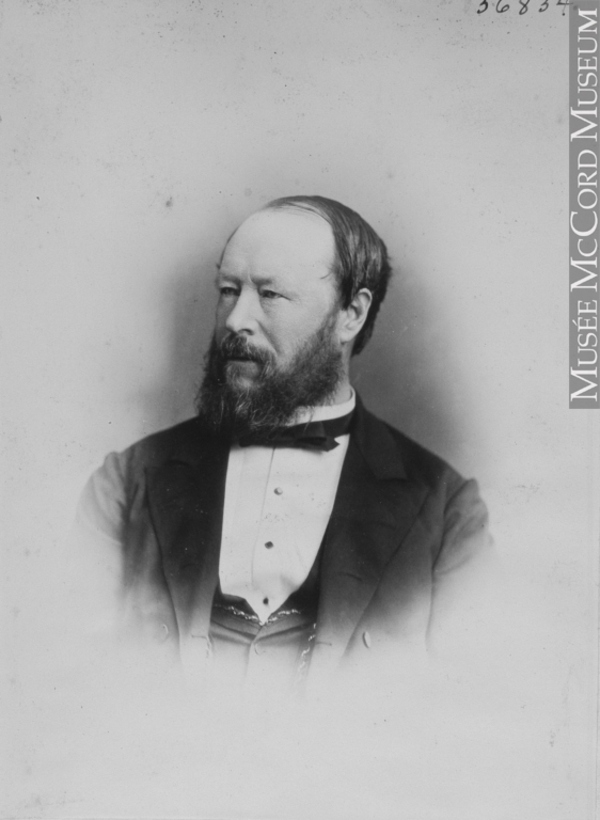
Source: Link
WORKMAN, THOMAS, businessman and politician; b. 17 June 1813 at Ballymacash, near Lisburn (Northern Ireland), seventh son of Joseph Workman and Catherine Goudie; m. in 1845 Annie, daughter of John Eadie (there were no children); d. 9 Oct. 1889 in Montreal, Que.
Thomas Workman immigrated to Canada in May 1827, joining his brothers in Montreal. He continued his education at the Union School, established by his brother Benjamin in 1819, where he was given a thorough mercantile training as well as instruction in English grammar, classics, and mathematics. After working in the office of the Canadian Courant, which Benjamin Workman had acquired from Nahum Mower in 1829, Thomas was employed by John White and Company, Montreal merchants. About 1834 he became a clerk in the wholesale iron and hardware firm of John Frothingham* and his own brother William*. Thomas became a partner in 1843 and following the retirement in 1859 of William and of Frothingham, he assumed control of the business which, under his direction, continued its growth as the largest wholesale hardware house in Canada. As well as importing goods from Britain and the United States, after 1853 it had begun manufacturing hardware at its own plant in Montreal’s new industrial quarter along the Lachine Canal.
With the success of the firm, Workman moved aggressively into other ventures such as banking, becoming a director and later vice-president and president of the Molson’s Bank, established in 1855. As well, Workman became involved as a director, along with Mathew Hamilton Gault, in the commencement of operations in 1871 by the Sun Mutual Life Insurance Company of Montreal (later the Sun Life Assurance Company of Canada). Workman served as its first president from 1871 until his death in 1889. His other business interests included the Citizens’ Insurance Company of Canada, the City and District Savings Bank, the Stadacona Fire and Life Insurance Company, and the Canada Shipping Company; he was also a director of the Montreal Merchants’ Exchange and Reading Room from 1863 to 1882, and invested heavily in Montreal real estate. From 1866 to 1887 he was a justice of the peace.
Like a number of other young Irish Protestant immigrants to Lower Canada, Workman joined the Doric Club, founded in Montreal in 1836 to preserve the “British connection.” The group’s 150 members assisted the authorities on a number of occasions. Workman, as a volunteer, participated in the defeat of the rebels at the bloody battle of Saint-Eustache and at Saint-Benoît, in the latter stages of the rebellion of 1837–38. Although these volunteers earned a lasting reputation for unbridled burning, looting, and murder, Workman was proud of his membership in this organization and later fondly remembered their exploits.
In 1867 Workman was elected as a Liberal to the Canadian parliament from Montreal Centre, but did not seek re-election in 1872 or 1874. In October 1875 he was returned to the House of Commons from Montreal West, defeating Thomas White in a sharply fought by-election, made necessary by the removal of the incumbent, Frederick McKenzie. In the commons Workman defended the interests of Montreal banking, manufacturing, and shipping firms. He did not run in 1878, and the seat passed to Gault, his business associate and a Conservative.
Workman supported a number of institutions in Montreal, including the Irish Protestant Benevolent Society, of which he was president for two years, the Fraser Institute, the Mackay Institution for Protestant Deaf Mutes, and McGill College. A Presbyterian until 1840 and member of the St Gabriel Street Church, he converted to Unitarianism under the influence of the Reverend John Cordner*, and was one of the founders of Montreal’s Church of the Messiah. On his death from diabetes, following the death of his wife by a few months, Workman bequeathed large sums from his estate, valued at one million dollars, to McGill College and local charities.
AC, Montréal, État civil, Unitariens, Messiah Unitarian Church (Montreal), 11 Oct. 1889. PAC, MG 30, D1, 31:24. Sun Life Assurance Company of Canada Arch. (Montreal), Card index to minutes, 1870–1931. Can., House of Commons, Debates, 1867–70, 1875–78; Parl., Sessional papers, 1880–81, VII, no.13. Parliamentary debates, Dominion of Canada . . . (3v., Ottawa, 1870–72), II-III. Gazette (Montreal), 10 Oct. 1889. La Minerve, 10 Oct. 1889. Montreal Daily Star, 10 Oct. 1889. CPC, 1877. Cyclopædia of Canadian biog. (Rose, 1886), 778. Montreal directory, 1863–87. Campbell, Hist. of Scotch Presbyterian Church. G. H. Harris, The president’s book; the story of the Sun Life Assurance Company of Canada (Montreal, 1928). Phillip Hewett, Unitarians in Canada (Toronto, 1978). “The company’s first president,” Sunshine (Montreal), January 1896: 4.
Gerald J. J. Tulchinsky, “WORKMAN, THOMAS,” in Dictionary of Canadian Biography, vol. 11, University of Toronto/Université Laval, 2003–, accessed November 28, 2024, http://www.biographi.ca/en/bio/workman_thomas_11E.html.
The citation above shows the format for footnotes and endnotes according to the Chicago manual of style (16th edition). Information to be used in other citation formats:
| Permalink: | http://www.biographi.ca/en/bio/workman_thomas_11E.html |
| Author of Article: | Gerald J. J. Tulchinsky |
| Title of Article: | WORKMAN, THOMAS |
| Publication Name: | Dictionary of Canadian Biography, vol. 11 |
| Publisher: | University of Toronto/Université Laval |
| Year of publication: | 1982 |
| Year of revision: | 1982 |
| Access Date: | November 28, 2024 |